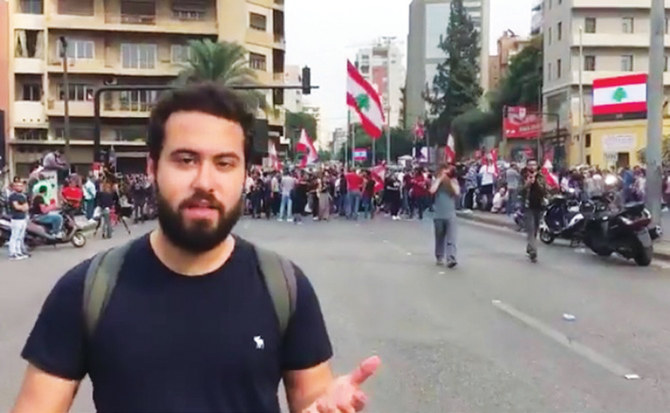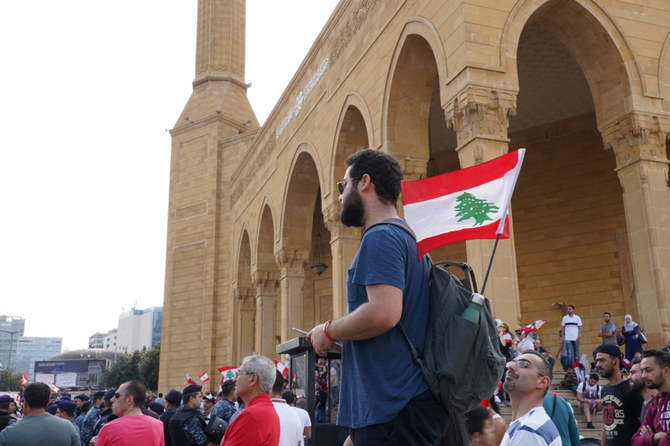BEIRUT: Shallow. Superficial. Politically motivated. These are some of the epithets being used by Lebanese men and women to describe the portrayal by the foreign media of the ongoing protests against the country's political elite.
From Sidon in the south to Hermel in the north, Lebanon is witnessing an unprecedented cross-community uprising as public frustration with the country's tottering economy, administrative paralysis, crumbling infrastructure and chronic corruption boils over.
From the very start, many Lebanese say, the protests have been mischaracterized by Twittering "armchair pundits" and sections of the foreign media as a "Whatsapp Revolution" because of the telcommunications minister's abortive attempt to introduce a daily $0.20 fee for users of Whatsapp and other internet-calling apps. Some Twitter users suggested the Lebanese "are going bonkers in the streets" because of the "Whatsapp tax."
It was not just comments on social media that many Lebanese found deeply objectionable. Time magazine had posted a photo on Instagram of burning tires with a caption that said: “Tension had simmered for months but on Thursday, protesters learned about the government's plan to tax Whatsapp calls. As the streets swelled, the Associated Press adds, that plan was withdrawn.”
The Instagram post spurred many Lebanese abroad into reporting it for playing into media stereotypes of the historic protests. But the attitude of some media outlets closer to home was seen as no less frivolous.
The New York Times carried an opinion piece with the sub-headline "The Middle East could use a decent country. One million Lebanese protestors are demanding one. Hezbollah has other ideas". The reference to “decent country” got heavy flak from Lebanese and Arabs on social media, prompting the newspaper to modify the sub-headline.
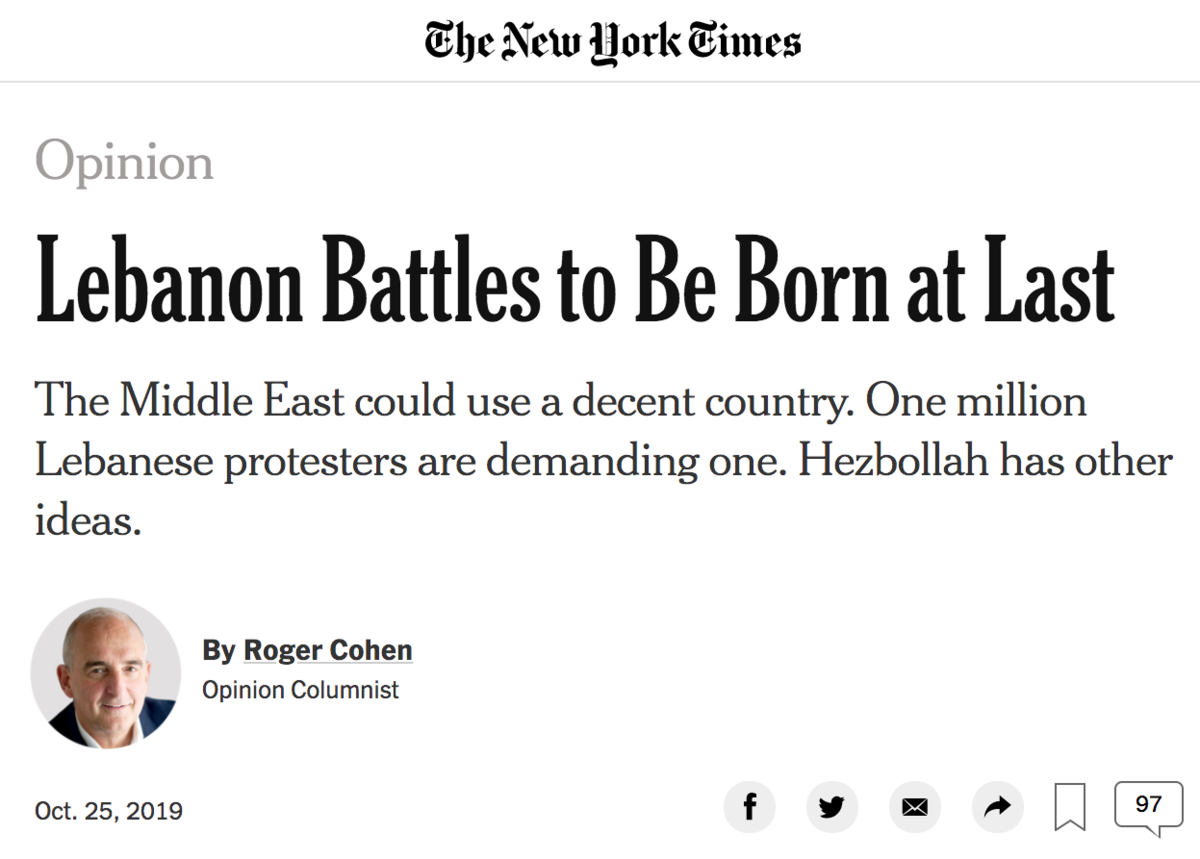
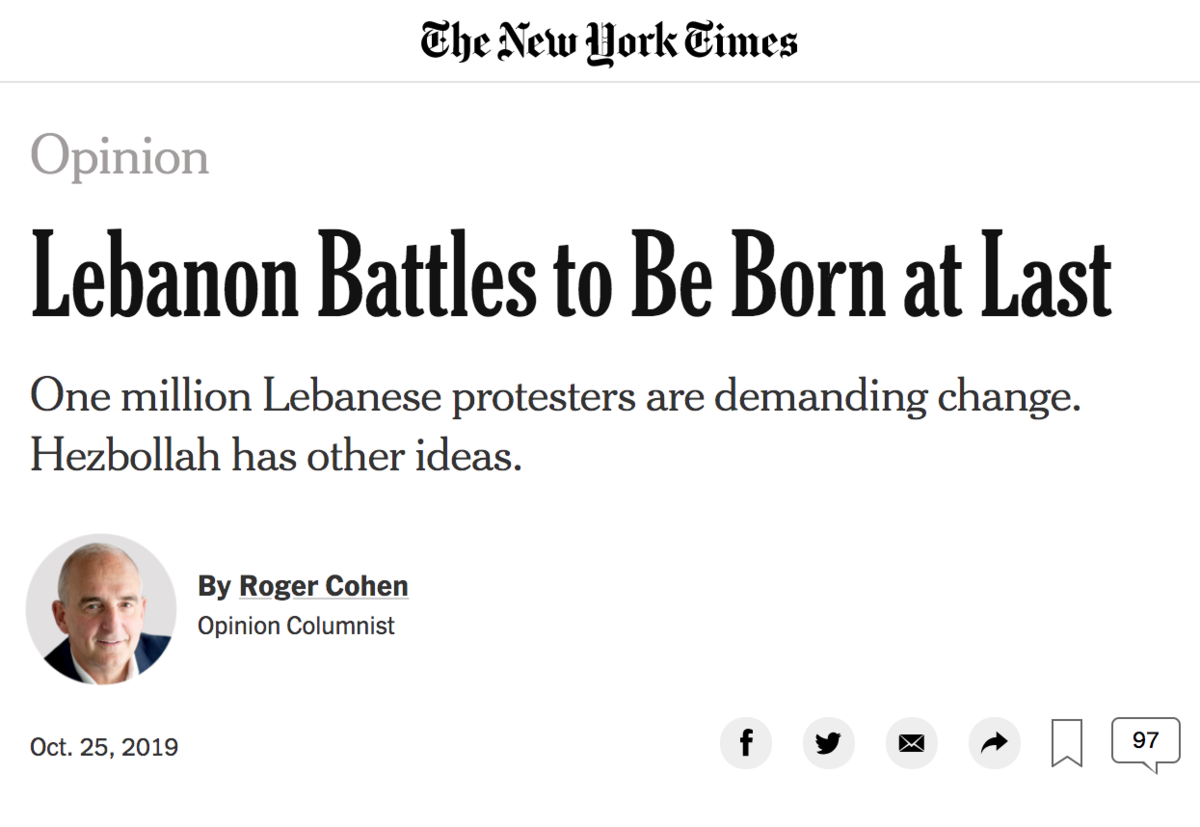
A Saudi daily carried a report on the protests decorated with images of what it described as Lebanon's “attractive and revolutionary” women, with the headline: “Lebanese babes: All the beautiful women are revolutionary.”
For a people who were defying deeply entrenched sectarian and political divisions to take part in the protests, such portrayal unsurprisingly struck a raw nerve. “They’re not taking this revolution seriously. They are not covering it as they should be,” Chourouk Kaassamany, a protestor, a protester interviewed by Arab News on the stairs of the Al-Amine mosque in Beirut's Martyrs Square.
“They are only looking at the negative part of the revolution, only those who are here to make jokes, to have fun, to dance. But they're not focusing on the serious people and the real message out of this revolution.”
The “revolution,” which entered its 13th day on Oct. 29, has not only attracted people of all sects, religions and social backgrounds, it has become a powerful outlet for the many concerns and grievances of Lebanese women, who have been participating in the solidarity rallies in very large numbers.
In almost all images, social-media posts and videos, Lebanese women have been at the forefront of the campaign, with their voices overtaking those of fellow male protesters.
To many Lebanese, a woman who kicked an armed bodyguard of a minister in the groin summed up the fearless, anti-establishment spirit of the movement.
The video of the incident, which went viral on Lebanese social media on the eve the protests, is credited by many with keeping the momentum of the protests going.
The footage shows an incident that occurred when the convoy of Minister of Education was confronted by demonstrators in central Beirut. When one of the minister's bodyguards got out of the car and fired his assault rifle into the air, it drew an angry reaction from the crowd.
During the scuffle, when another bodyguard held up his gun into the air, the now famous woman leaned back and landed a kick with her left foot on his groin.
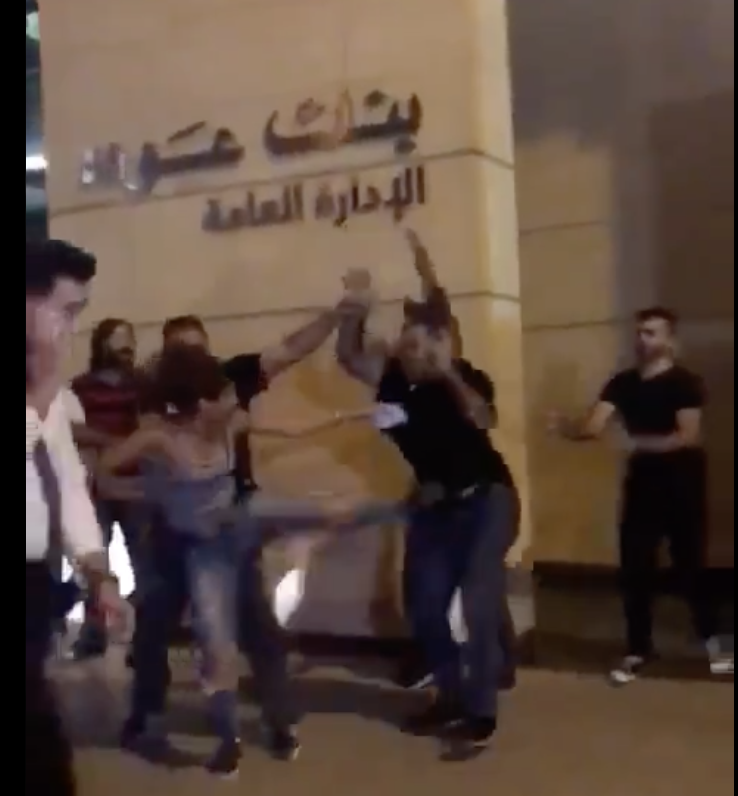
The bodyguard can be seen staggering forward in a state of shock.
The clip is seen by many Lebanese as an accurate — and inspiring — snapshot of the campaign against political corruption and misrule.
“When they steal your money, corrupt your country, and pull a machine gun at you — you give them a quick kick in the groin!” one Twitter user wrote.
Another said: “Our women don’t just kick ass, they kick men with guns.”
As part of a collective outpouring of anger not seen since the civil war ended in 1990, Lebanese have formed a human chain across the country, joining hands along coastal roads in an attempt to span 171 kilometers from south to north.
The continuing anger against politicians accused of corruption and driving Lebanon towards an economic collapse has compelled the government to announce an emergency reform package among several other steps.
“Eventually, we're here for a reason,” Kaassamany said. "We're not here to dance, we're not here to sing, we're not here to party. We are here to deliver a message on behalf of those who cannot afford to eat, cannot afford to go to hospitals, cannot afford to do many other things.
“We are here especially the people who cannot take part in the protests. The media should not focus on people dancing and enjoying themselves. Instead they should take the developments more seriously.”
Another protester, Josee Arbajian, found the foreign media's fixation on the lighter aspects of the protests “shameful” because the people of Lebanon are “out here doing their best” but are being portrayed in a frivolous light.
What especially irks Lebanese is the use of words such as “festival” and “rave revolution” in international media reports to describe some of the public rallies' throbbing vibe and ambiance.
For proof, critics say, one need look no farther than the disproportionate media interest generated by the scenes of a DJ playing music for a huge crowd of protesters in Sahet Al-Nour in Tripoli, of elderly people dancing and singing together in Zouk, and a full stage set up in Martyrs Square playing revolutionary chants.
“Lebanese have been known to have this spirit of perseverance, so if this is the way we have to protest, go down on the streets and stay down their all night and protest peacefully in a civil way, if that's portrayed as a rave or whatever the Western media portrays it, then let them portray it this way,” Maya, a protestor in Riad Al-Solh Square in Beirut, told Arab News.
“If you want to add music to it, that's fine. If it keeps people on the streets, then it's fine. It's not easy to protest on the streets day and night.”
Nevertheless, on ABC’s The View host Whoopi Goldberg showed a video of protestors singing the song “Baby Shark” to a frightened child in a car, which went viral around the world as numerous media outlets picked it up.
Predictably, Lebanese media personalities have joined the chorus of their compatriots’ criticism, with Ali Jaber, MBC's director of television and an “Arabs Got Talent” judge, taking issue with the way the protests are being covered by prominent international news outlets.
“Foreign coverage of the revolution in Lebanon was shallow and superficial,” Jaber said on Twitter. “CNN rarely mentioned the news in its bulletins, and Time magazine and others have trivially emphasized (Lebanese Foreign Minister) Gebran Bassil through the ‘hela ho’ chants and pictures of our beautiful women. Just think a little …”


